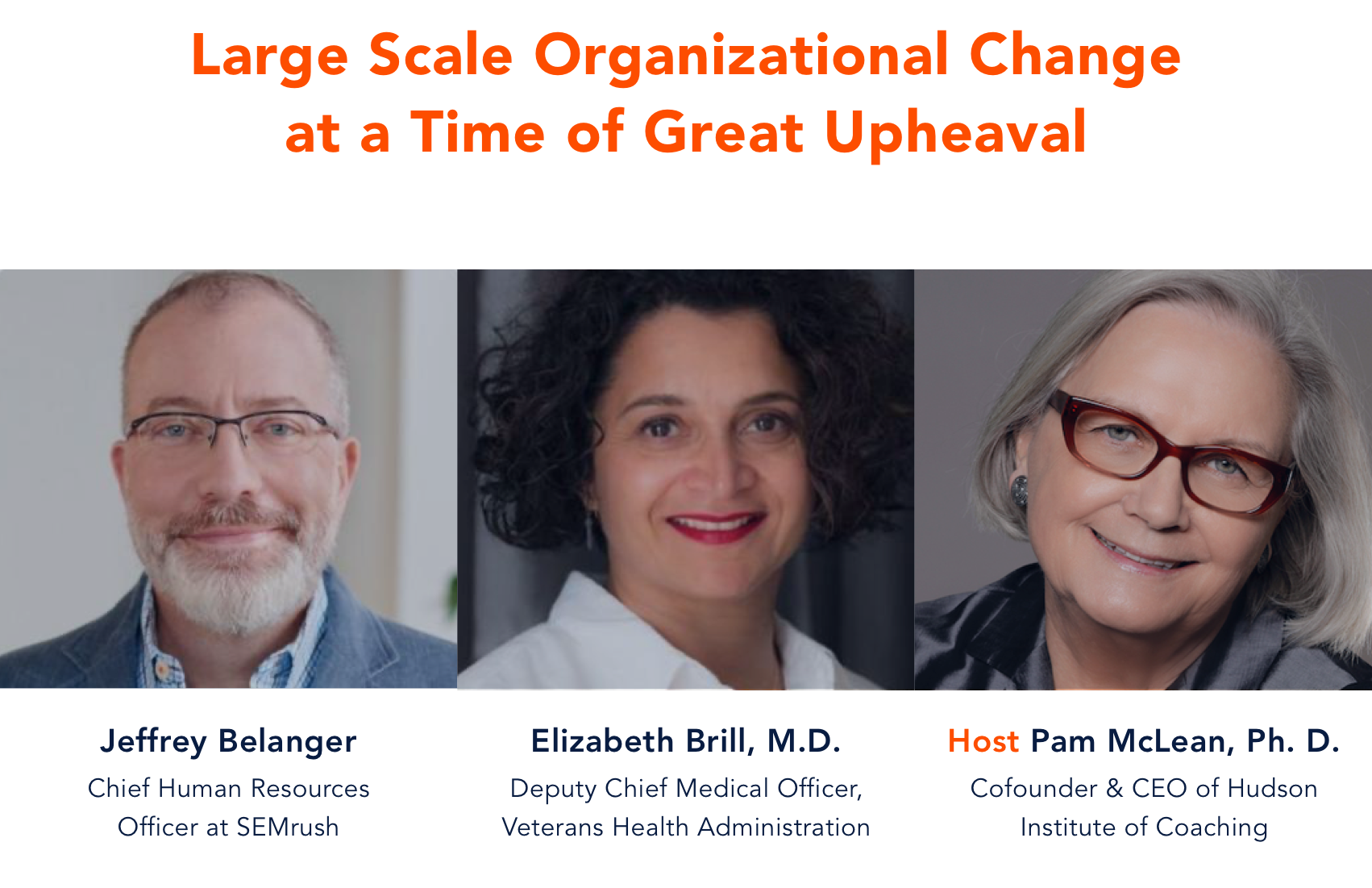
This is a recap of our Q3 2021 Hudson Coaching Conversation: Large-Scale Organizational Change at a Time of Great Upheaval. Watch the full video here.
The Coronavirus has changed the way we work – and that might be a good thing.
Rarely has the workplace faced the kind of seismic shifts as those wrought by the Coronavirus pandemic. From mass resignations and labor shortages, to a heightened sense of empowerment among employees, the changes that began in 2020 continue to reshape organizations in ways we are only now starting to comprehend.
In our Hudson Institute of Coaching Conversation, “Large Scale Organizational Change at a Time of Great Upheaval,” Pam McLean, Chief Knowledge Officer and co-founder of the Hudson Coaching Institute, was joined by Elizabeth Brill, M.D, and Jeffrey Belanger. As the Deputy Chief Medical Officer for the Veterans’ Health Administration, Dr. Brill is responsible for operational program areas for a staff of over 7,000. Mr. Belanger is the Chief Human Resources Officer at SEMrush, an online marketing company with a global reach. The organizations each works with may be very different from each other, but as they shared their insights with Pam McLean, several key themes emerged.
Entitlement, or Empowerment?
The coronavirus has changed the traditional balance of power between an organization and its employees. Following are the key takeaways about what these changes are, and how organizations might respond to them:
- Employees are in a position of power like never before. Businesses have suffered a shortage of workers as employees were obliged, or chose, to stay home. Daily media reports described workers as “essential,” and “heroes,” and companies that once may have taken their staff for granted put up help wanted signs.
- Employees responded by advocating for better pay, enhanced benefits, and more flexible work schedules. As Jeffrey Belanger put it, “this environment has created a sense of…not entitlement, but empowerment for employees to structure their work environment in a way that maximizes their potential.”
- Companies must distinguish between entitlement and empowerment, and strive to maximize their employees’ effectiveness by having conversations about what employees want from the workplace, and by responding to create the kind of workplace that retains talent.
- Organizations must address long-buried issues around work-life balance, compensation, and career growth. Whether it’s building in time to work from home, or rethinking the duties an employee has traditionally performed, now is the perfect time to ascertain what a company can do to set their employees up for success and address their individual needs.
- Organizations that fail to have these conversations may find themselves bleeding talent, and it’s better to face these issues head-on than to pretend that the old rules still apply. As Brill said, “If you’re not helping your employees find out what their next step is, they’re going to find it on their own. And they’re not going to involve you.”
Rules of Engagement
The rules that once governed business have changed, and for many organizations, the transition was abrupt. Belanger described the shift from in-office operations to remote work as “a light switch of change,” and Brill recalled her organization being told to, essentially, “go home.” This overnight change in how work gets done has several implications:
- Businesses must reimagine workflows and business processes such as onboarding, recruiting, and evaluating employees. Online communication tools can be combined with occasional in-person meetings to keep the office functioning, but managers need to be creative and flexible.
- Organizations need to accept that, though offices may be empty, work is still getting done. Belanger initially worried about productivity, but began to realize that “productivity can happen amid change.” In fact, he said, his company exceeded their goals for the first 6-month period of remote work.
- Managers should be intentional about opportunities to mentor and collaborate, since there are far fewer organic opportunities to do these things. Water-cooler conversations are things of 2019, and it’s more difficult to pop into someone’s office for an off-the-cuff chat. However, because leaders must now make time to check in with employees, it’s more likely that each individual receives the attention they need.
- Leaders must make the most out of times that employees are in the office. There’s no time to waste during in-person meetings, and employers must use this time to be focused and direct about business goals and next steps.
- Companies should understand that new ways of working have their upsides. Fewer in-person meetings could mean less time spent on scheduling and small-talk. Employees may be happier and more relaxed now that their commute to the office has been eliminated, for example. And finally, online collaboration can allow for more flexibility, as employees can dial in at any time, and from any location.
Equal Opportunity
The pandemic has led to extreme hardship for many workers, particularly front-line workers who are unable to perform their tasks remotely. But for employees who are able to work from home, this new way of working may have encouraged equity in the organization in some surprising ways:
- The relative anonymity of online tools like Zoom and chat can have a leveling influence on an organization. Employees who may not have felt comfortable speaking up in meetings may be more apt to make a comment or type a question when they’re shielded by a screen.
- For introverts and neurodiverse employees, the control online tools offer makes communicating easier, and safer. And for extroverts, online communication has “calmed and slowed them,” according to Belanger, “and forced them to be more patient.”
- Online tools like Zoom have erased the divide between home and the workplace. Now that everyone is at home, everyone is required to participate in running that home. Brill hopes that, as men get a glimpse of the juggling that is required to maintain a household, tasks like cleaning, laundry, and childcare may be shared more equitably than in the past.
Searching for Purpose
In these unprecedented times, when risk lurks around every corner and upheaval is a daily reality, working just to earn a living is no longer enough. Employees have changed the way they think about work, and this requires organizations to think differently about their employees if they want to retain them.
- Employees want to know that their work matters; to them, to their families, and to the larger society. The pandemic has forced them to reflect on what is important, and whether and how work fits in to these priorities. Work now must have purpose, and must meaningfully contribute to the employee’s life.
- Employees are focused on work-life balance more than ever before. They are willing to trade big paychecks in exchange for fewer lengthy commutes, dry-cleaning bills, and missed kids’ bedtimes.
- Leaders should do the “deep work” of evaluating how their organization does (or doesn’t) mesh with the fabric of employees’ lives, and take steps to balance the demands of the workplace. By putting the workplace under a microscope, managers can discover the purpose each worker has as part of the organization, and can help that worker discover it, too.
At the conclusion of the conversation, Elizabeth Brill hearkened back to the LifeForward training program she attended with the Hudson Institute of Coaching, recalling that managers in the training were encouraged to think about their employees’ readiness to tackle their roles and meet their responsibilities. She remembered learning that managers should strive to listen to their employees and to meet them where they are.
The pandemic has meant loss and hardship for millions, but when it comes to the workplace, it has also forced a shift that organizations and their leaders may finally be ready for. People are open to reflection, to doing things a different way, and to casting off rules that hinder growth and development. Things may have changed dramatically, but smart workplaces will understand that change doesn’t have to evoke fear. As Brill noted about the new realities we face in our lives and in our workplaces, “The entire world can do it differently, and it still works.”
